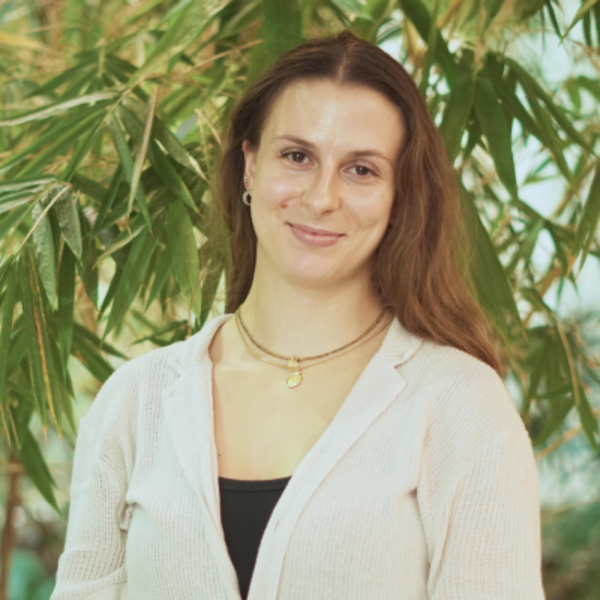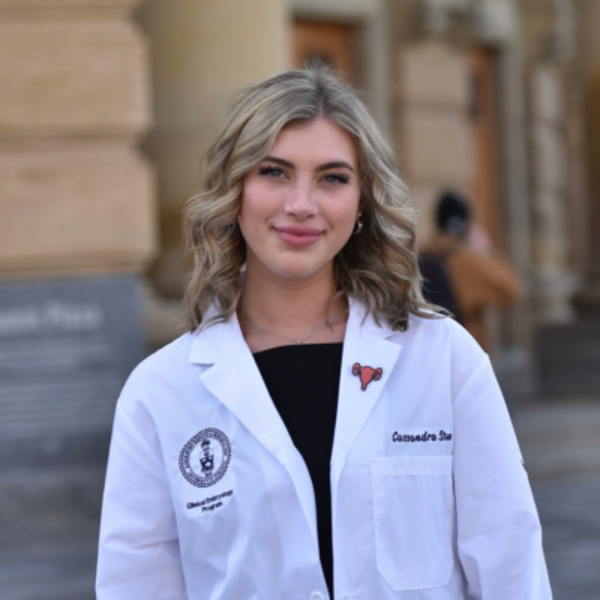Meet our Clinical Embryologists-in-training this World Embryologist Day!

World IVF, or World Embryologist Day, is celebrated every year on July 25, marking the birth of the first test-tube baby in 1978.
According to the Canadian Fertility & Andrology Society, one in six Canadians experience infertility. Clinical Embryologists play a crucial role in Laboratory Medicine, being at the forefront of fertility treatments.
This year to celebrate World Embryologist Day, we spoke to some our trainee Clinical Embryologists about what motivated them to train in this field and what they’ve experienced in our program so far.

Amanda Dias
“I have always had a passion for science and a fascination with cells. Through my academic journey, I found myself drawn to classes and conversations about reproductive health and medicine. Exploring research in a laboratory setting during my undergrad paved the way for my interest in laboratory-based work. I knew that I wanted a career where I could combine these elements and make a significant impact within healthcare. I am eager to become a Clinical Embryologist so I can help people achieve their dreams of building a family.
My favourite experiences in the program have been meeting my cohort, professors, and mentors in the field. It has been so great to connect and learn from individuals with different backgrounds and interests who also share my passion for reproductive sciences. This past semester, I’ve had the chance to take part in labs and simulations that allow us to apply the theoretical knowledge we gained during our first year. These hands-on activities have been incredibly stimulating and make the learning process very engaging and rewarding.
One thing that has surprised me is how dynamic the field of Assisted Reproductive Technologies (ART) is. The constant advancements and innovations mean that there is always something new to learn. The rapid pace at which these technologies are developing keeps the work exciting. I hope to one day be able to contribute to these progressions in the ART field.”

Megan MacRae
“Maternal-fetal health has always been a big interest of mine which led me to pursue a research position focusing on placental development. Throughout this experience I became increasingly passionate about the field of reproductive medicine, lab medicine and the science behind human development leading me to the CE program. More importantly, the ability to make an impact on individuals and couples lives by helping them achieve their dream of having a child is incredibly rewarding and allows me to give back to others.
My best experience in the program so far has been participating in a work-study at Mount Sinai Fertility. This experience has directly exposed me to the role and daily tasks of an embryologist. Specifically, being able to interact with patients, watching oocyte retrievals and embryo transfers firsthand was a great experience. Further, this experience allowed me to be exposed to the impact that embryologists make on patients' lives.
Since starting the program, I have been surprised by the significant impact of technological advancements in the field of clinical embryology. The precision and sophistication of tools such as time-lapse imaging, genetic screening (PGT), Intracytoplasmic Sperm Injection (ICSI), banking and more, have revolutionized how embryologists assess and select embryos, leading to improved success rates. This has motivated me to want to be a part of the change involved in this field to help individuals achieve their dreams of having a successful pregnancy.”

Taylor Pham
“Like many people my age, I was confused as to what I wanted to do after finishing my undergraduate studies. I've been interested in reproductive sciences for as long as I can remember, probably because I loved watching the TLC show "A Baby Story" with my grandmother. When I stumbled upon this program offered by U of T, I immediately knew with a curriculum that combined course work and independent research projects, that it was the perfect fit for me. I also always wanted to pursue a career that allowed me to pursue my passions while helping others. The work of an embryologist is exactly that — it goes far beyond their role in the lab, their impact can be seen in each and every precious life they help a family to conceive.
My favourite experience in this program has been gaining hands-on experience in the Clinical Embryology Simulation Lab (CESL). Seeing sperm swim for the first time under a microscope was so exciting. Working with tiny, delicate oocytes and embryos during micromanipulation procedures has truly deepened my admiration for the incredible dexterity skills that embryologists possess.
Through being in this program, I have realized how important it is to have a solid theoretical understanding of a range of scientific disciplines. While manual dexterity is important, grasping the reasons behind procedures and the past research shaping our practices is vital. Learning about reproductive biology, embryology, genetics, molecular biology, and assisted reproductive technologies has greatly benefited me. This knowledge has been invaluable for both my Capstone research project and for performing micromanipulation procedures confidently.”

Thien Hy Quach
“My interest in this field was sparked when I first studied developmental biology and realized the precision needed for proper embryo development. We often overlook how challenging it is to be born healthy, which requires numerous biological pathways to work perfectly. Even a small mistake can lead to serious consequences.
This led me to get involved in various developmental research projects during my undergrad. In one of these projects, I worked with chicken embryos. The moment I opened an eggshell and saw a tiny, beating heart, I was struck by how precious and fragile life is. Driven by my motivation and compassion for embryo life and my desire to help those aspiring to build families, I was determined to join this program.
One of the best experiences has been participate in lectures taught by healthcare providers who are actively working in the field of reproductive medicine. These lectures exposed me to many latest technological advancements, allowing me to better understand the impacts and the development happening in the field. This summer, I also had the opportunity to practice in the CESL simulation lab to learn realistic laboratory skills, and in this lab, I was able to see the actual size of embryos to realize how small and fragile they are!
We can have a profound impact on helping people conceive and bringing new life into the world. It is incredibly fulfilling to study and perform the precise manipulations, knowing that our work directly helps others build their families. The program allows us to immerse ourselves in various research topics making us better appreciate the efforts of many dedicated individuals working to help bring a healthy baby to the parents who chose In Vitro Fertilization.”

Raquel Rodrigues
“Initially, this field greatly interested me because of very special people in my life, including my cousin and my boyfriend, that were created with the help of assisted reproductive technology (ART). Contributing to this field, I feel that I am giving back for these lives that I was blessed with.
One of the most valuable experiences of this program is the CESL that was specifically designed for supplementing our learning. This has provided us with unique hands-on training working with reproductive material before handling human specimens in a real IVF lab. There are also many debates in this program which not only enhance our presentation skills, but also provide us with the skills to critically appraise research articles to assess laboratory applications. In this field, there will always be new technologies emerging. Being able to appraise research is critical when deciding whether to include (or exclude) an element in a laboratory setting or in a patient’s care.
This program has educated us to the legislation that governs assisted reproductive technologies and research in Canada. One thing that surprised me about this profession is how challenging it is for the Assisted Human Reproduction Act (2004) to keep up with developments. Although regulations have since been released under this act, this field has drastically evolved in the last 20 years, and therefore this act may need to be revisited. I believe the next frontier in our field is in vitro gametogenesis, which can be applied to a variety of patient cases such as azoospermic males or oncology patients. I hope that legislation can be revisited to determine the ethical and legal bounds of this technology, among others.”

Cassandra Stan
“I joined this program because I have always been fascinated by the intricacies of human reproduction and development. Becoming a Clinical Embryologist aligns perfectly with my desire for helping individuals and allows me the opportunity to contribute to the field of reproductive medicine and help families achieve their dreams of parenthood.
One of the most rewarding experiences in the program has been the second-year Capstone Research Project. My project has exposed me to many different laboratory experiments and techniques and has allowed me to showcase my skills in creating novel protocols to help advance this field of science.
Since starting the program, I have been surprised and delighted by the rapid advancements in the field of embryology. The constant uptake of innovations and new cutting-edge technologies have aided in revolutionizing the way we understand and manipulate early human development, thereby granting us better fertility outcomes. Within such a short period of time, the advancements within this field have been significant, ultimately leading the way to a very exciting future of innovative success.”

Vanessa Vuong
“There aren’t many programs in Canada that give research and hands-on experience, as embryologists are traditionally trained through apprenticeships. I wanted to join the CE program because it provided a unique opportunity to be involved in a patient’s fertility treatment plan by caring for embryos and gametes in the lab. I felt that this career path would provide a rewarding experience knowing embryologists play a part in helping eager couples complete their family goals.
The best experience in the CE program so far is definitely the simulation lab where we learn different techniques that an embryologist would need from day to day. I never knew that you could see an oocyte in a dish with your naked eye until now.
Something that I have learned about the profession that has surprised me would be the technological advances in the field. Techniques such as time-lapse imaging and integrating AI software into the laboratory were beyond what I initially imagined. These innovations significantly improve the chances of successful pregnancies and offer new insights into embryonic development.”
The University of Toronto has developed the first program of its kind to educate Clinical Embryologists, within the Department of Laboratory Medicine, with essential support from the Department of Obstetrics and Gynaecology: the MHSc in Laboratory Medicine (Clinical Embryology – CE - Field).
See also
Ob-Gyn and LMP faculty publish paper sharing insights and successes of MHSc in Clinical Embryology
This story showcases the following pillars of the LMP strategic plan: Inclusive Community (pillar 1), Dynamic Collaboration (pillar 2) and Agile Education (pillar 5).



